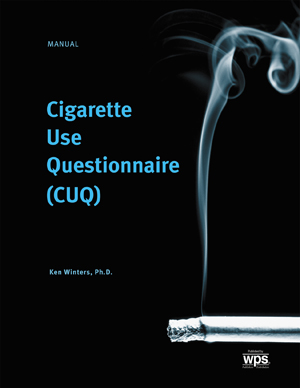| ||||||
|
| |||||||||||||||||||||||||||||||||||||||||
Quickly determine what factors contribute to a smoker’s addiction
Cigarette smoking is one of the most persistent addictions. Only 6% of smokers who try to quit succeed for more than a month. These odds can be improved, however, if health professionals identify and address the personal and environmental factors that sustain addiction.
The Cigarette Use Questionnaire (CUQ) helps clinicians evaluate, refer, and treat people who wish to quit smoking or must do so for health reasons. It is intended to measure factors related to cigarette use for the purpose of discussing, planning, and evaluating effective smoking cessation treatment and for research about cigarette use. This straightforward self-report questionnaire can be administered to individuals or groups in only 10 minutes. With 44 items written at a fifth-grade reading level, the CUQ generates the following scores:
In addition, two validity scores alert clinicians to defensiveness and inconsistent responding on the client’s part.
CUQ scores correlate with frequency, intensity, and duration of cigarette smoking, and with participation in smoking cessation treatment. Norms are based on a nationally representative sample of 609 adults, aged 18 to 83.
Increase the likelihood of success
Research shows that therapy is more effective when it’s individualized. This is why the CUQ is such a powerful smoking cessation tool. For each smoker, the test identifies personal and situational factors related to cigarette use, making it easier for clinicians to understand the particular addiction and plan effective treatment. The personalized assessment provided by the CUQ increases the odds of success in any smoking cessation program — particularly those that employ a cognitive-behavioral approach.
Component
KIT: Includes 25 AutoScore Forms and 1 Manual




